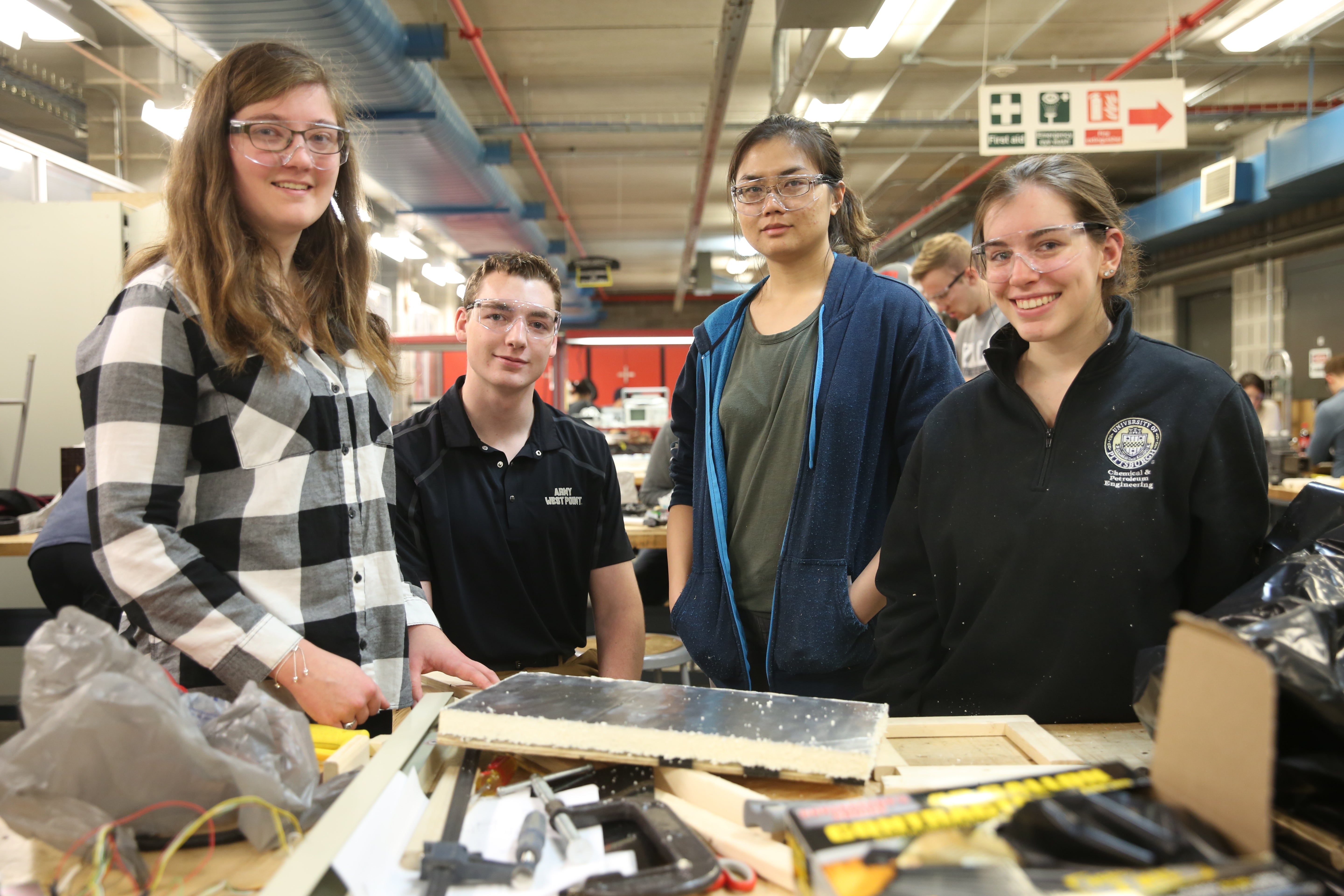Every day, everywhere, challenges impact our lives and the lives of those around us. People sometimes have great ideas, but haven’t quite hit on a solution. Or maybe they’re not exactly clear on the problem. For engineering students and technological innovators at Rensselaer Polytechnic Institute: there’s a course for that. It’s called Inventor’s Studio I and it’s housed in the Department of Mechanical, Aerospace, and Nuclear Engineering (MANE).
“We’re teaching the next generation of innovators how to identify problems and seek creative solutions so that they can have a positive impact on people’s lives,” says Suvranu De, head of MANE.
De describes the Inventor’s Studio series as an end-to-end process for fledgling designers and aspiring entrepreneurs that want to “make things happen” and impact global change through creativity, invention, design, and implementation.
One critical hallmark: collaboration.
“We’re teaching our students at Rensselaer to be highly educated in technical areas, and they’re very savvy when they get out. But they absolutely must also have the non-technical skill of being collaborative,” De says.
Inventor’s Studio I is the first course in a sequence of three courses that make up the “Innovation Spine” of MANE. Studio I helps design-thinkers innovate in a highly collaborative, non-judgmental setting that relies on the group’s collective thinking to build on each other’s ideas.
In Inventor’s Studio II, the teams complete their designs, advance prototypes, apply for patent protection, and license their designs. Once the patent applications are written, those that survive a faculty screening are filed for provisional patents. This process is done in conjunction with the Office of Intellectual Property and Technology Transfer and its director, Bruce Hunter.
In Inventor’s Studio III, students design a Lean manufacturing process to manufacture pilot quantities of their Minimum Viable Product (MVP). In addition, using Design for Six Sigma (DFSS) and Lean methodologies, they design a pilot manufacturing operation, including the supply chain, and resources needed. Students conduct interviews of suppliers, as well as possible customers, to validate the prototype of their MVP. The final documentation could be used to seek funding from investors, as well as government agencies.
Building on a Unique Ecosystem
MANE’s Inventor’s Studio innovation spine is unlike any other university program in the country, De says. In fact, the entire MANE innovative ecosystem works beyond the basic innovation and design courses to move students through the entrepreneurial process, from design to prototyping to patenting to startup.
The Inventor’s Studio series builds on the legacy of the late Burt Swersey, a beloved professor who taught in MANE for more than 25 years. As the principal architect of the first Inventor’s Studio in 2001, Swersey stood firm in his belief that Rensselaer students and faculty will continue to play leading roles in discovering solutions to grand, global challenges.
Here’s a glimpse at the other working parts of MANE’S Innovative Ecosystem:
Annual awards. The Innovation Awards and Startup Founder Awards recognize students with at least one Inventor’s Studio course who have filed a patent application (Innovation) or launched and registered a startup (Startup Founders) as a student. The inaugural awards in 2016 recognized four Innovators and three Startups. In 2018, 10 Innovators and four Startups were recognized. Departmentwide, De says, the goal is to capture at least 10 percent of the department’s 1,500 students with an expectation of setting up their own company.
Innovators in Engineering. This seminar series explores the innovative research taking place outside Rensselaer. Speakers are invited to give a talk on their innovation in a company, startup, or industrial research lab. Forum is provided for speakers to interact informally with undergraduate students who are aspiring innovators and startup founders.
Engineering Innovations for Society (EIS) challenge. Held for the first time this year, the student design competition is set to become an annual event. With a focus on social entrepreneurship, it drew 31 students from the very best schools of the Northeast, including Massachusetts Institute of Technology (MIT), Yale University, Columbia University, and West Point, to solve challenges posed by the Center for Disability Services (CDS) of Albany, New York. The projects, conducted over the course of two and a half days, included a dental stability device, a Parkinson’s writing assistant, improving a feeding tube device, and a canopy to protect patients who use wheelchairs from the elements during transfer to vehicles.
Prizes included $10,000 for first place, $4,000 for second place, and $2,000 for third place.
MANE student research and design journal. The MANE Student Research, Innovation, and Design Journal showcases some of the impactful research and innovative design work performed by undergraduate students across MANE’s cutting-edge laboratories. This journal is completely student-run and composed entirely of undergraduate students’ contributions to research and innovative solutions to design problems developed by students.
Maker Space: The Forge. This student-managed facility in the George M. Low Center for Industrial Innovation promotes a maker community at Rensselaer. Supported by 3D printing equipment, smartboards, laser cutters, and other equipment, The Forge is a knowledge hub with links to campuswide maker and fabrication facilities, as well as collaboration outside RPI.
Stan Weiss Colloquium on Design Development. Stanley Weiss ’46, an alumnus with notable achievements in industry (VP of Lockheed) and academia (MIT and Stanford University), has generously endowed a seminar series in design, with an eye to inspiring the next generation of students. Recent speakers have come from such forward-looking companies as Nike, Microsoft, and IDEO.
Certification Programs: MANE currently offers two certification programs: Lean Design for Six Sigma – Innovation & Product Design and Development Certificate, and Global Challenges Certificate. Both certificate programs require students to take Innovation Spine courses, a computational course, and a co-op experience.


